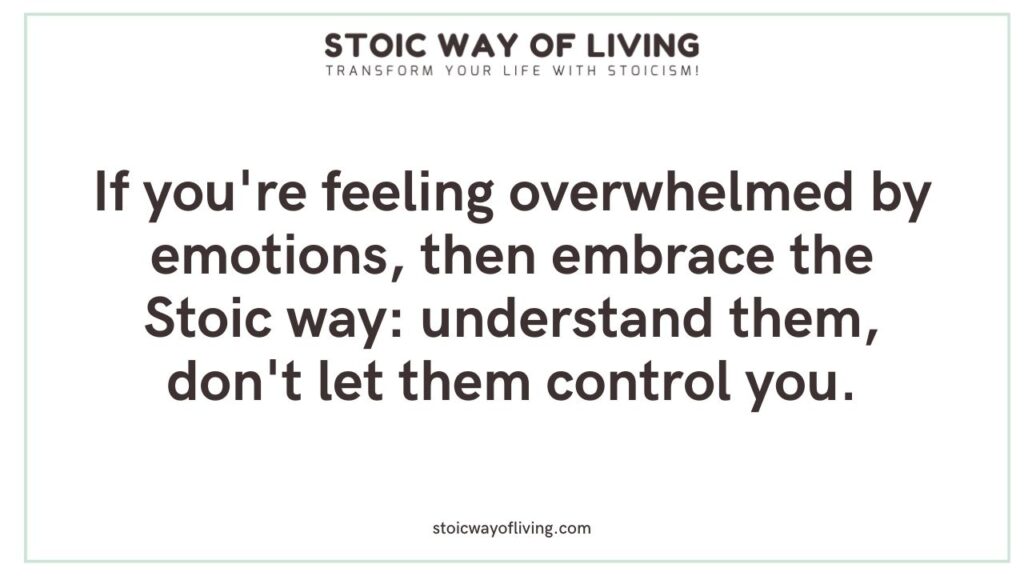Are emotions compatible with stoic philosophy? That age-old question has sparked many debates and discussions among philosophers and scholars alike.
In this article, we explore the fascinating concept of Stoicism and delve into whether Stoics can truly experience emotions. Stay tuned!
Can Stoics Experience Emotions?

Stoicism is a philosophical school of thought that originated in ancient Greece and later influenced many aspects of Roman culture.
It is often misconstrued as a belief system that rejects emotions altogether.
However, the truth is that stoics experience emotions but approach them from a unique perspective.
Emotions According to Stoic Philosophy
Stoicism is centered on pursuing wisdom and virtue. It aims to live a life following reason and natural law. It teaches individuals to focus on what is within their control and to accept what is not.
Stoics believe true happiness and fulfillment can only be achieved by cultivating inner resilience and virtuous character traits.
In stoic philosophy, emotions are a natural part of human existence. However, they are not regarded as inherent or uncontrollable reactions to external events.
Instead, stoics view emotions as evaluative judgments based on our perceptions and beliefs about the world.
The Dichotomy of Control and Emotions
A key concept in stoic philosophy is the dichotomy of control. This principle helps individuals understand what is within their control and what is not.
Stoics believe our thoughts, emotions, and actions are the only things in our control. External events, other people’s actions, and outcomes are not within our control.
Examining How Stoics Handle Emotions
Stoics approach emotions by acknowledging and accepting them as natural human experiences.
Rather than trying to suppress or avoid emotions, stoics believe in understanding the reasoning behind their feelings.
By examining their judgments and beliefs, they can gain valuable insight into themselves and their world perception.

Recognizing the Role of Passions in Controlling Emotions
Within stoicism, passions are seen as excessive and irrational forms of emotions.
Passions are characterized by their intensity, ability to overpower reason, and virtuous judgment.
Stoics recognize that passions can cloud judgment and lead to harmful actions and negative consequences.
Therefore, they advocate for cultivating emotional resilience to prevent the dominance of passions.
Emotions as Value Judgments
Stoics view emotions as value judgments based on our interpretations of events and situations.
They believe that emotions are not imposed upon us by external factors but are instead a result of our evaluations.
By recognizing this, stoics strive to develop the ability to assess the rationality and validity of their emotions, allowing them to respond more effectively to challenging situations.
Stoic Perspective on Negative Emotions
Negative emotions, such as fear, anger, and grief, are not dismissed or suppressed by stoics.
Instead, stoics approach negative emotions as opportunities for growth and self-improvement.
They believe that by critically examining the underlying beliefs and judgments that give rise to negative emotions, individuals can work towards transforming these emotions into more rational and productive responses.
Stoic Perspective on Positive Emotions
While stoics acknowledge the value of positive emotions, they advocate for moderation and balance in experiencing them.
They believe excessive attachment to transient pleasures and desires can lead to dissatisfaction and unhappiness.
Instead, stoics emphasize cultivating virtuous positive emotions, such as joy, love, and pleasure, based on rational judgments aligned with one’s moral values.

Differentiating Between Emotions and Reactions
Stoics understand the distinction between emotions and reactions. Emotions are natural and arise within us, but our reactions are within our control.
Stoics aim to respond to emotions calmly and rationally, guided by their principles and values.
By practicing detachment and maintaining composure, stoics can avoid being overwhelmed by emotions and make deliberate choices in their thoughts, words, and actions.
Practical Techniques to Manage Emotions
Stoicism offers a variety of practical techniques to help manage and channel emotions constructively.
These techniques include self-reflection, journaling, and the practice of self-discipline.
By examining their emotions and beliefs, stoics can gain better self-awareness and make conscious choices that align with their values and pursuit of virtue.
Conclusion
stoics experience emotions but approach them with a unique perspective rooted in reason and virtue.
Stoicism teaches individuals to acknowledge and accept their feelings while evaluating their judgments and beliefs that give rise to these emotions.
Stoics strive to cultivate a balanced and virtuous life guided by rationality and moral principles by practicing emotional resilience, detachment, and stability.
So, while stoics may experience emotions, their approach allows them to navigate through life’s challenges with wisdom and inner strength.


